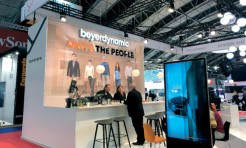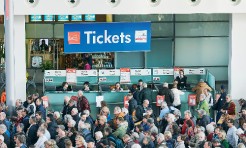Poland: The future of trade fairs
In early October, Ptak Warsaw Expo invited numerous trade fair and economic experts to a new format: Expo4Future. There received some fascinating insights into what awaits us in the future.

One of the highlights of the talks and lectures was the presence of the still officiating UFI President Craig Newman, now the “Outgoing President”. At the event in Warsaw, he listed the five trends of 2019 - which we will certainly also see a lot of in the coming months. They are based on discussions that the UFI team had with association members around the globe. Trend one is shifting trade patterns in an increasingly jittery global economy. This ought to mean major changes over the next decade. Measured by gross domestic product, the USA, China, Japan and Germany are currently the Top Four of the leading economic nations. According to an IMF forecast, the four most populous countries could replace them at the top by 2030: China, India, the USA and Indonesia. Traditional economic nations such as Japan and Germany would then drop to the ninth and tenth places respectively.

Craig Newman then highlighted the second trend: “Digital is everywhere - but not everything,” meaning that we can observe a digitisation of services, processes and tasks. “The search is on for new digital business areas off the beaten track,” explained the South African trade fair manager. “However, personal conversations cannot be digitised.” Of course - and this marks the third trend - the foundations should also be consistent. This means that trade fairs are made for exhibitors and visitors. This is the bread and butter of trade fairs, Newman confirmed. He pointed to a joint survey conducted last year by UFI and Explori: “Global Visitor Insights”. The two institutions surveyed 13,000 trade fair visitors from 135 countries. Among other things, their aim was to find out what visitors find really irritating. Surprisingly, “basics” was one of the most frequent answers. For example, they miss more seats for relaxation, and find that catering also shows room for improvement.

Consolidation and cooperation in the exhibition industry is trend number four. Mergers and acquisitions are driven by the desire of many tour operators to open up new geographical markets. And the fifth trend deals with more diversity in the upper echelons, which makes companies more resilient - think: women in management positions. UFI itself sets a good example with its current, first female president, Mary Larkin. Craig Newman also reported on the expectations of the future generation, the so-called millennials, in the Polish capital. “This target group wants to be inspired,” he explained, based on the words of futurologist Tessa van Asselt at the UFI 2016 European Conference in Basel. “Millennials want to actively participate and not just listen. They want to be given skills and knowledge, and share this with others. They are searching for experiences and adventures instead of for possessions and wish to be surprised as they search.” These are the needs the organisers of B2B events must meet (www.ufi.org).
Author: Peter Borstel
This article was published in TFI issue 4/2019
Share in Facebook, Twitter or Google+:
TFI - Trade Fairs International - The International Trade Fair Magazine.
© 2006 - 2024 by TFI-Verlagsgesellschaft mbH. All rights reserved. TFI-Verlagsgesellschaft mbH shall accept no responsibility for the contents of external links and other contents.
TFI-Know-how
-
What to do when things go wrong at virtual or in-person events?

In the event world, it’s simply part of life if things don’t work out as planned.
-
How can networking be made to work at online events?

Networking typically happens at real, in-person events. But it’s also possible to do it online; it just works a little differently. There are various options available to organisers.
-
How can exhibitors stand out at trade fairs?

New products and a well-conceived stand design are not the only drivers for a successful presence. Many other factors are also important, but trade fair planners often lose sight of them.
-
How can industry decision-makers be reached online?

Trade fairs and trade fair companies need to constantly further develop, become more agile and flexible and offer services all year round. New, digital offerings are very important here. With its TrustedTargeting technology, Messe München offers its customers access to leading business-to-business decision-makers on the Internet.


